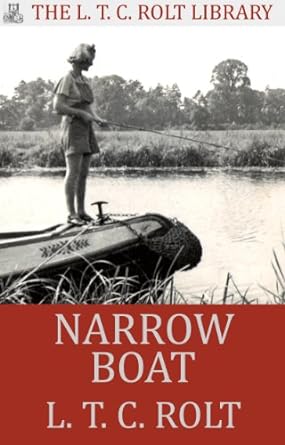
Thank you to blogger The Classics Club for hosting the #CCSpins. Want to know more? Click the linked text.
My Interest
“…it was a veritable Sargasso….’
“The countryman knows no unease in the elemental silence of lonely places; but when the people of the towns return to the land they have forsaken…it is to find its solitude intolerable, so complete is their estrangement. This is one of the tragic results of the drifts to towns.”
Since reading Narrowboat Summer (UK title: Three Women and a Boat) by Ann Youngson, I’ve been fascinated by the British canals and their amazing narrowboats–houseboats of a certain type. I was so enthused that I watched all the seasons of Timothy West and Prunella Scales’ t.v. show Our Great Canal Journeys, in which they journey on their own narrowboat. I’m now somewhat obsessed! I’ve been on a boat about 3 times in my life and one of those was an inflatable. But, like the new Tiny Houses, the narrowboats [canal boats] strongly appeal to me. In looking for ever more about them, I came across this book described as the “classic” of canal boat literature. I knew I had to read it. I didn’t even bother checking the library–I just bought it for my Kindle.
According to the Foreword of my edition (yes I at least skim those) these lines led to the saving and revising of the canal system in the UK.
“If the canals are left to the mercies of economists and scientific planners, before many years are past the last of them will become a weedy, stagnant ditch, and the bright boats will rot at the wharves, to live on only in old men’s memories. It is because I fear that this may happen that I have made this record of them.”
The Story
Just before World War II started, LTC Rolt acquired a narrowboat or canalboat called Cressy. He did the work, or hired specialists, to get the boat into good working order and then set out on Britain’s then neglected canal system–still partly in use for moving goods. He married and he and his wife had their leisurely honeymoon aboard Cressy–taking the canals, working the locks, stopping at inns and pubs for an occasional meal and seeing local landmarks.
Rolt’s observations on the environmental damage of the country’s rapid industrialization in the century just passed couple with his intuition of what all of this was doing to people are amazing. His writing is excellent, beautifully describing the countryside and describing all-to-well the nastiness of the polluting factories and motor vehicles.
“I find myself marveling at the mania of hurry which has infected our happy civilization.” [This quote reminded me of C.S. Lewis’ Screwtape Letters in which the devil tells his nephew to keep people too busy for what matters]
“…the meal proved that is was possible, by use of imagination, to escape from the inevitable roast- and two-veg, tinned soup and tinned fruit of the average country hotel dinner. Yet for all its excellence, I was disappointed to find that the meal was cosmopolitan in origin, and not, as I had hoped, a revival of genuine English cooking.”
“The average cook knows less of the value of herbs, spices and seasonings than did her forbear in the humblest farmhouse, and, what is more, she has lost the art of taking pains.”
This book anticipates so much of today’s world:
- Local food
- Unplugging
- Slow productivity
- Artisan crafts
- Historic preservation
- Pollution
- Sustainability
- Authenticity
- Inability of modern people to be alone or in total quiet
“The Saturday market is very different. Here come the wives of the men from the factories with contents of Friday night’s pay envelopes….The crowd around the vendors of shoddy clothing [fast fashion] and gawdy ornaments [Dollar Tree home decor]….”
“[the] ugliness and squalor which underlie the superficial pomp and circumstance of all great cites. We saw the reeking gas-works, mountainous refuses dumps, the power-station with its gigantic steam capped cooling towers….above all, the countless mean streets where dwelt the servants of these monsters.”
My Thoughts
There were strong echoes of Scott and Helen Nearing’s [Living] The Good Life, but that is natural since both came about in the 1930s when people were experimenting with radical solutions to problems in the world and beginning to understand that industrialization had a huge downside.
“…is besieged on all sides by semi-detached monstrosities whose growth has recently received fresh impetus from new industrial expansion.”
Rolt hated the cookie-cutter houses now selling for millions as classic 1920’s 1930’s semi’s or dethatched on the British house shows I love like Location, Location, Location–-they were the McMansions of their day. Disgust at urbanization, industrial waste, terrible urban manners, lack of grace, lack of what we today call green spaces, the destruction of local food culture–it’s all so vivid in Rolt’s writing.
The peace and tranquility that he and his wife enjoy on their floating home showed the people of their era, and every era since, of the necessity for “unplugging” and being in peace and quiet and out in nature.
Just as nice as the writing were the illustrations which may have been new to my edition. On my kindle they look like woodcut prints. My artist great-uncle did a lot of these as well as color lithography. I loved them.
Note: As with all books of a different age, there is a word used once that would never be used today. Not the N-word but the C–n one that means the same.
This book was incredibly rich in language and so wonderful to read. I read it slowly for that is what it demands. This a book to savor whether you love canals and narrowboats or not.
My Verdict
4.25
Narrow Boat by L.T.C. Rolt
I read the Kindle version of this book.


I enjoy reading your comments!